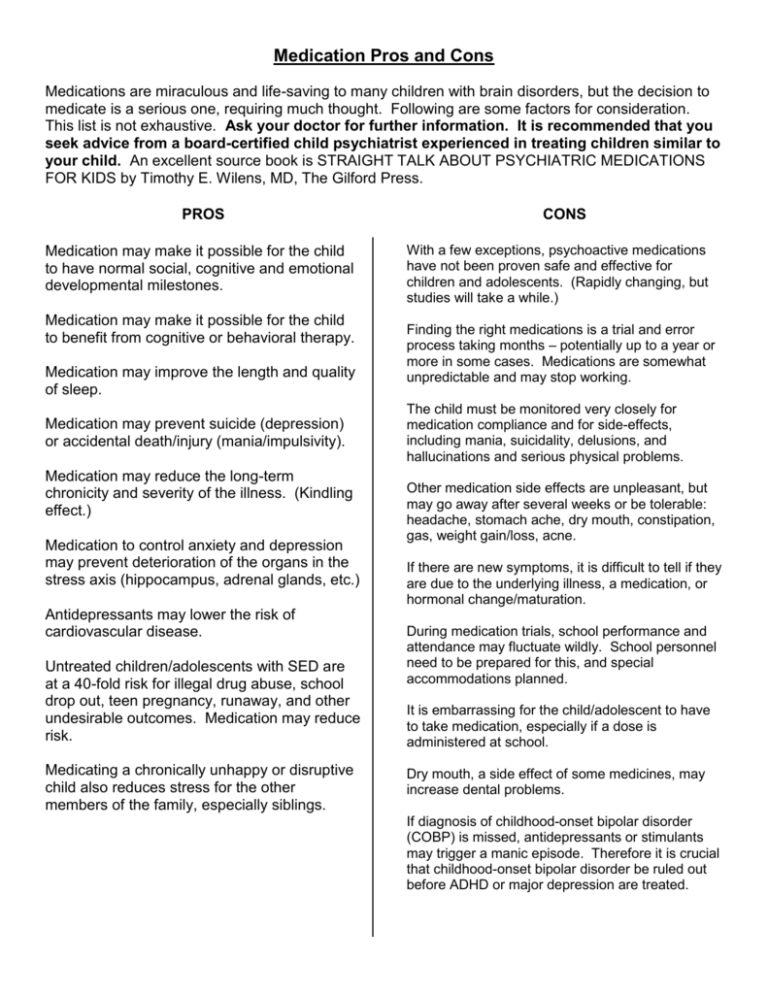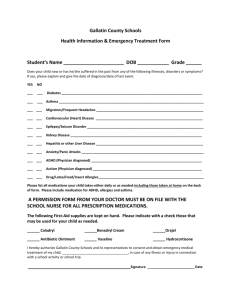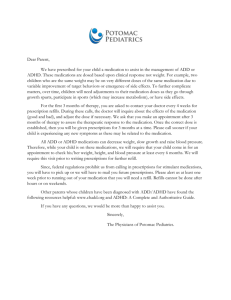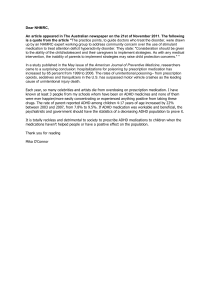Medication fact sheet
advertisement

Medication Pros and Cons Medications are miraculous and life-saving to many children with brain disorders, but the decision to medicate is a serious one, requiring much thought. Following are some factors for consideration. This list is not exhaustive. Ask your doctor for further information. It is recommended that you seek advice from a board-certified child psychiatrist experienced in treating children similar to your child. An excellent source book is STRAIGHT TALK ABOUT PSYCHIATRIC MEDICATIONS FOR KIDS by Timothy E. Wilens, MD, The Gilford Press. PROS Medication may make it possible for the child to have normal social, cognitive and emotional developmental milestones. Medication may make it possible for the child to benefit from cognitive or behavioral therapy. Medication may improve the length and quality of sleep. Medication may prevent suicide (depression) or accidental death/injury (mania/impulsivity). Medication may reduce the long-term chronicity and severity of the illness. (Kindling effect.) Medication to control anxiety and depression may prevent deterioration of the organs in the stress axis (hippocampus, adrenal glands, etc.) Antidepressants may lower the risk of cardiovascular disease. Untreated children/adolescents with SED are at a 40-fold risk for illegal drug abuse, school drop out, teen pregnancy, runaway, and other undesirable outcomes. Medication may reduce risk. Medicating a chronically unhappy or disruptive child also reduces stress for the other members of the family, especially siblings. CONS With a few exceptions, psychoactive medications have not been proven safe and effective for children and adolescents. (Rapidly changing, but studies will take a while.) Finding the right medications is a trial and error process taking months – potentially up to a year or more in some cases. Medications are somewhat unpredictable and may stop working. The child must be monitored very closely for medication compliance and for side-effects, including mania, suicidality, delusions, and hallucinations and serious physical problems. Other medication side effects are unpleasant, but may go away after several weeks or be tolerable: headache, stomach ache, dry mouth, constipation, gas, weight gain/loss, acne. If there are new symptoms, it is difficult to tell if they are due to the underlying illness, a medication, or hormonal change/maturation. During medication trials, school performance and attendance may fluctuate wildly. School personnel need to be prepared for this, and special accommodations planned. It is embarrassing for the child/adolescent to have to take medication, especially if a dose is administered at school. Dry mouth, a side effect of some medicines, may increase dental problems. If diagnosis of childhood-onset bipolar disorder (COBP) is missed, antidepressants or stimulants may trigger a manic episode. Therefore it is crucial that childhood-onset bipolar disorder be ruled out before ADHD or major depression are treated. Classes of Psychiatric Medications for Children Psychostimulants - treat ADHD – Improve learning, behavior in 8 of 10 students – Remaining 20% helped by psychiatrists using variety of medications, various combinations. – Common psychostimulants include, but are not limited to, Adderall, Ritalin, Dexedrine, Concerta, Metadate. – New non-stimulant medication for ADHD, Strattera. Anti-depressants - treat OCD, depression, anxiety disorders, Tourettes, eating disorders. Newer antidepressants include, but are not limited to, SSRI’s - Prozac, Zoloft, Paxil, Celexa, Luvox. Also, Wellbutrin, Effexor, Serzone. Anti-psychotic medications - wide range of uses – 1st line treatment to reduce hallucinations, delusions, – Treat aggression, OCD, refractory bipolar, Pervasive Developmental Disorders (PDD) Commonly used “atypical” meds include Clozaril, Seroquel, Risperdal, Zyprexa, Geodon (ziprasidone), Abilify. Anti-hypertensives: – Used to treat tic disorders, ADHD, severe PDD (self-abusive behavior), autism, sleep problems. – Reduces aggressive behaviors, severe outbursts Commonly used: Clonidine, Tenex, Inderol. Mood stabilizers: – To treat mood swings of Bipolar Disorder, Conduct Disorder, ADHD. – Also for violent aggression and irritability caused by mood. Commonly used: Lithium salts, Tegretol, Depakote. Newer meds include, but are not limited to, Neurontin, Topomax, Gabitril, Lamictal, Trileptal. Anti-anxiety Medications – Used for muscle relaxant, anticonvulsant, sedation. – Psychiatrically prescribed for anxiety, and for prominent anxiety symptoms accompanying autism. Includes Benzodiazepines (Ativan, Klonopin, Valium, Xanex). Buspar used for anxiety, aggression, 2nd line treatment for ADHD, affect-driven aggression with oppositional symptoms. Polypharmacy – the highly effective practice of prescribing multiple medications in a combination tailored to individual’s symptoms and responses. A small dose of one may enhance the action of another medication. Smaller doses of several medications are preferable with children to avoid toxicity. May need multiple meds to manage side-effects when medication change is not feasible.







